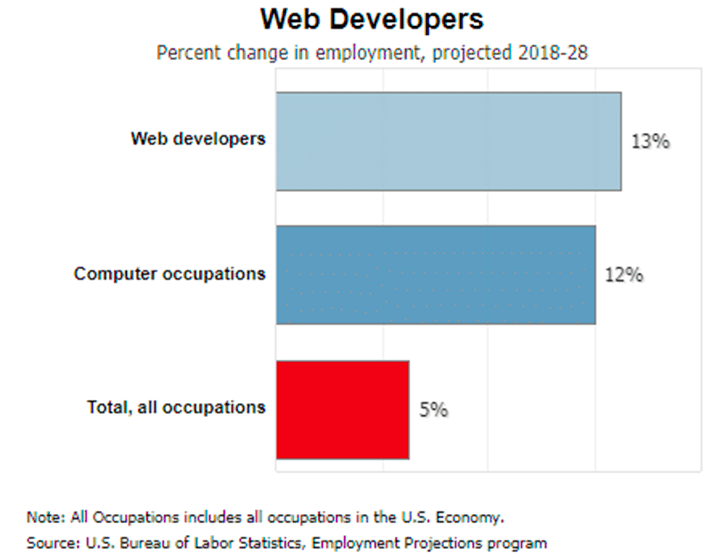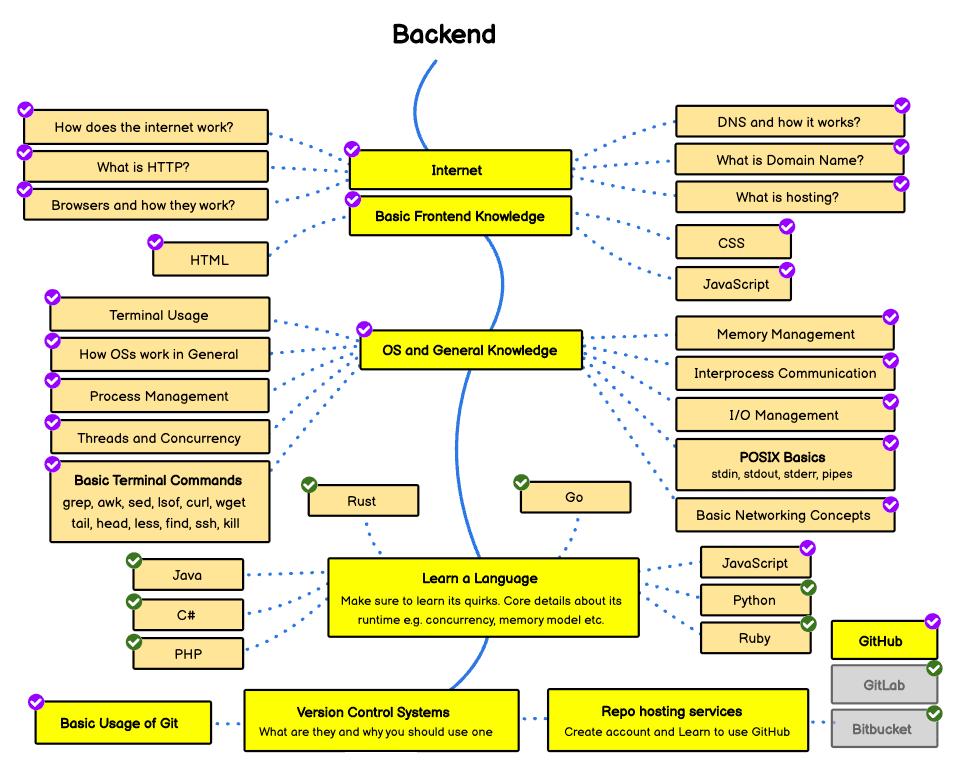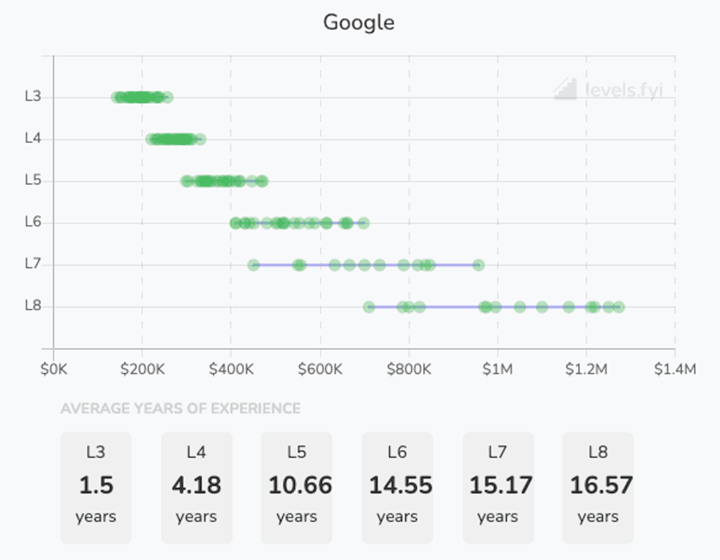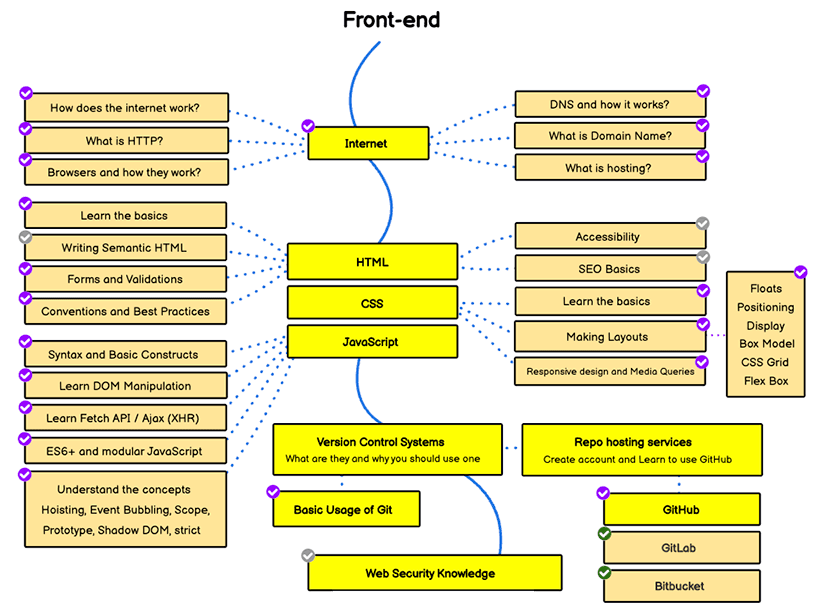Web Developer Career Path
Web developers come with different skillsets (e.g. frontend vs backend) and levels (e.g. junior, senior, lead), it can be quite confusing especially if you are at the start of your web developer journey.
This post will guide you on your web development career path. But first, let's start with the basics...
Is Web Development a good career in 2022?
Yes, web development is a good career choice for many different reasons.
Unlike the prestigious careers of old, the barrier to entry in web development is very low, and getting lower all the time. Where in law, medicine and investment banking a degree from a fancy school is a near mandatory requirement forcing people in a lifetime of student debt, web developers can come from all walks of life, learn for free and demand 6 figure salaries after just a few years on the job.
Further, the demand for web developers it at an all time high with the number of web development jobs expected to significantly outpace all industries.

What Computer Specs Do I Need for Web Development?
Unlike game development or app development you can get away with a relatively lightweight machine for web development. Many learning platforms run in-browser and when you start to develop your own projects you will find that the amount of horse power needed to run a web app that one person can build is pretty low.
So, you don’t need to spend thousands on a machine, anything mid level, Mac or WIndows is fine. Some ballpark recommendations:
- If you have an Intel Processor: i5 or better
- If you have an AMD Processor: Ryzen 5+ or better
- If you have a Mac: Any machine from the last ~6 years will be fine
Oh, and you'll need an internet connection but if you’re here we can assume you have that covered.
Getting started in Web Development
Web developers break their careers up into junior, mid, senior, staff and principle engineers/developer titles, with the first obviously being junior developer.
The best first step into web development is probably to begin with frontend development. Frontend development is the process of building the interface which the user interacts with e.g. a website displayed in the browser.
The image below is the recommended learning roadmap to becoming a frontend developer.
To build your first website as a frontend developer, it is recommended that you you learn HTML, Javascript and CSS:
- HTML is used to define the structure of a website e.g. the title text, headings, paragraphs etc
- CSS is used to style the website e.g. changing the colour of fonts etc
- Javascript is used to make the website dynamic by reacting to inputs made by the user e.g. show a popup window when a button is clicked
Once you have the basics, keep building small (personal) projects to improve your skills.
Would you like a 4 day work week?
How to get your First Web Developer Job
It can be difficult to land your first web developer position so initially you should focus on making your profile standout. You could try the following approach:
- Create a small portfolio of 1-3 projects. These could be commercial freelance projects or your own pet projects
- Commit your code to Github. Make sure it's only your own projects though and not work for clients
- Create a 1 page resume / CV. You're at the start of your career, so it should be 1 page, or 2 pages maximum.
- Apply for a web development internship (optional)
- Build a portfolio website to showcase your projects and resume (optional)
- Create a Linkedin profile
- Update your Linkedin profile to "open to work"
- Start applying to jobs on various remote job boards.
It can be difficult to get started so don't worry if you don't get much traction to begin with. Keep refining steps 1-5 before applying to more jobs. Rest assured though, once you get your first job though, it gets much easier to land your next role.
Entry Level Web Developer
Expectations of a junior web developer are quite low, you will be expected to know how to write small, contained blocks of code and minor changes to an existing system with some supervision and oversight. It is expected that you will ask a lot of questions and get stuck on a regular basis.
Often in your first few weeks / months as an entry level web developer you'll find yourself fixing other people's bugs to help you get a feel for the code base. Once you've mastered this stage, you'll begin creating your own features / UI elements within the application.
At this stage you could apply for an entry level software engineering job on websites such as No CS Degree (their jobs don't require a Computing Science degree).
Mid Level Web Developer
In general, it's more common to begin working on the frontend before working on the backend codebase but once you gain some more experience, you should be expected to have good backend knowledge.
Being a backend developer is different from its frontend counterpart in that you aren't building interfaces, but instead writing code which is run on the server i.e. the "behind these scenes" activities and processes.
Plus, you'll be developing using different languages. Instead of writing Javascript / HTML / CSS, you'll be writing code in backend languages, most likely: PHP, Python, Node or Go. If you are just getting started and are limited on time then focus on Javascript as it can run in the browser and on servers as well i.e. Node = Javascript on the backend.
Below is a diagram of a common roadmap towards becoming a backend developer:

You will also need to have an understanding of some kind of database technology, SQL continues to be the main database technology of the web (i.e. MySQL and Postgresql are the most popular in this category), however NoSQL based systems like MongoDB or Firebase are excellent alternatives with a lower barrier to entry.
Whatever your preference it will inform the next phase of your career as you look for promotions and new roles.
Career Path to Senior Web Developer
Once you move out of the realm of being a junior developer you will need to start to make some active decisions on what you want to focus on.
Web development is a vocation and therefore is something you get better at by doing. The more time you spend in front of a keyboard writing code, the better a developer you will be. No senior developer started out senior - they all went through a phase of not knowing what they were doing where they made mistakes, fought with a missing semicolon for 3 hours and generally wondered if they were worth the chair they were sat in.
You will have a good feel at this stage for the variety of work available to you and the different technologies you could focus on as mentioned above. Once you have a few years experience as a junior web developer, you will be able to apply for senior web developer jobs.
One of differences between a senior a junior role is the ability to mentor junior developers by taking an active role in setting your team's culture and best practices. You will also be expected to own a system or two, maintaining it, improving it and documenting how it works for future developers down the line once you move on.
You will find yourself in more meetings, speaking to a wider range of stakeholders and getting a much stronger understanding of the value IT brings to the business you are in. Many web developers see this as a nuisance, however it is important to bare in mind that no matter how spectacular your technical skill stare you will languish as a mid level individual contributor for much of your career if you don’t develop the softer skills that allow you to deliver the most impact to your employer or clients.
You are being paid to solve problems and a big part of that requires web developers to understand the context in which their code runs and why it is needed in the first place, by this point in your career you will be expected to have knowledge and opinions that can inform these kinds of discussions.
Career Path to Lead Web Developer
By the time you've taken to become a senior web developer, you will hopefully work on a number of different areas and get a feel for what you like and dislike. If you have a flare for design then frontend development is likely an area you would want to focus on, if you love crunching though big data sets and designing processes then you will probably feel more comfortable as a back end developer, or you might like it all and want to stay general as a full stack developer.
From this point, there are two branches that you can consider to progress your career further:
Management
If you enjoy the communication, team and interpersonal skills aspect of the work, then engineering manager, CTO or architect are the likely stops on the remainder of your journey.
These require a strong understanding of web development, how a system should be structured, the trade offs of various technology types and the ability to see technical trends as they emerge and adopt the most applicable. At this level you will have a strong influence on the business and operate at the interface between technology and commercial. The main downside for some is that you will write very little code.
After a number of years just writing code many see this as a blessing but, others, who were maybe pushed down the management path, see it very much as a curse.
Technical leadership
If, at mid career, you find yourself still fully engaged with the process of writing code and developing systems and you want to keep doing that then a larger company with a technical growth track will be the best place for you.
These companies appreciate the years and hours you have spent honing your craft and will provide a path that takes you through senior developer, staff engineer and ultimately principle.
These salaries at this level are truly astronomical and reflect the enormous value you can bring with this level of experience. You are bringing all the benefit of the expensive mistakes you have made and seen, the far reaching changes to complex systems you have orchestrated and your ability to design and deploy vast swathes of technological infrastructure.
For example, if you land your dream job at Google, the salaries for principal engineers are breathtaking:

Web developer career summary
The career of a web developer is ever changing, 20 years ago it looked very different to now and no doubt in 20 years time it will look very different again. The pace of change means that it is a vibrant and fulfilling career for those who love to learn, love to build and want to make something that can be used by millions.
This article is a guest blog post by Simon Barker, an experienced senior developer who loves to help others on their coding journey. Through his blog Career Switch To Coding, same titled free book and podcast, he helps developers with non traditional backgrounds successfully transition to the world of development and have successful, fulfilling careers to reach their life ambitions.
To get more updates by Simon, check out his Twitter or Instagram
